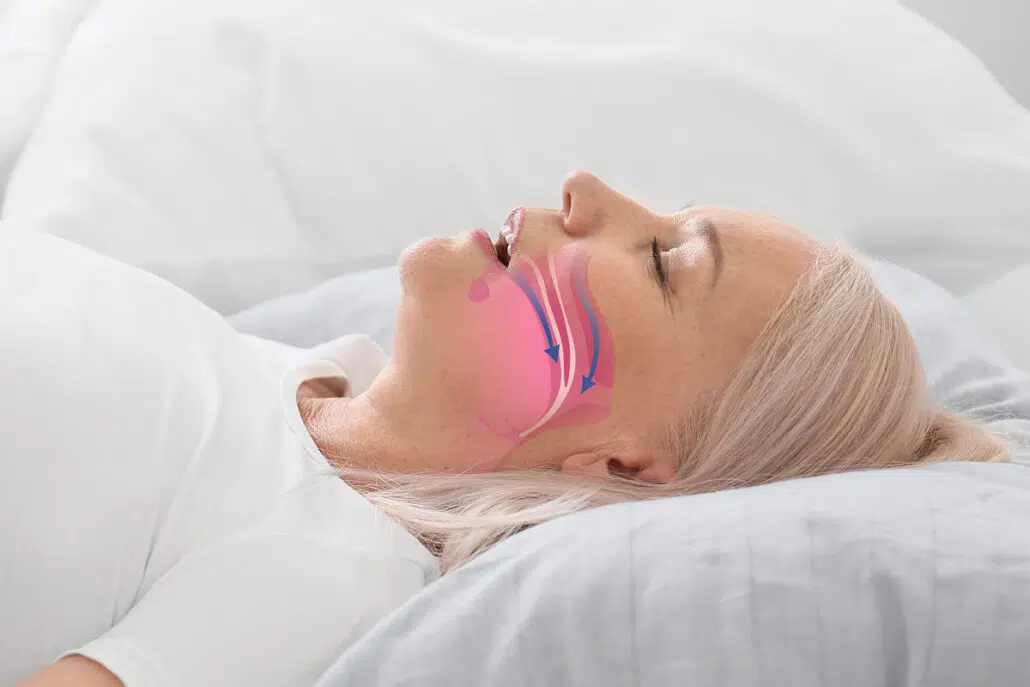Although snoring may seem like a harmless annoyance, it can be a sign of an underlying health condition that requires medical attention. It can lead to sleep deprivation for both the snorers and their partners, resulting in fatigue, irritability, and even long-term health problems.
The specialists at Penn Medicine Becker ENT & Allergy can treat snoring by providing guidance and management. In this comprehensive guide, we will discuss the causes of snoring and offer various tips and treatments to help you stop snoring and enjoy a peaceful night’s sleep.

What is Snoring?
Snoring occurs when airflow through the mouth and nose is partially blocked during sleep. This obstruction makes the surrounding tissues vibrate, producing the familiar sound of snoring. Snoring can vary in volume and frequency, and it may be an occasional annoyance or a chronic problem that significantly affects sleep quality. At times, snoring may occur due to sleep disorders associated with obstructive sleep apnea.
Causes of Snoring
There are several factors that can contribute to snoring, including:
- Anatomy: The structure of your mouth, throat, and nasal passages can affect your likelihood of snoring. A low, thick, soft palate or enlarged tonsils can narrow the airway, making it more challenging for air to pass through.
- Nasal congestion: Blocked nasal passages can obstruct airflow, leading to snoring. This can be caused by allergies, sinus infections, or a deviated septum.
- Obesity: Excess body weight, particularly around the neck, can put pressure on the airway and increase the risk of snoring.
- Alcohol and sedatives: Consuming alcohol or taking sedatives before bedtime can relax the muscles in the throat, making it more likely for the airway to become partially blocked during sleep, and make snoring worse.
- Sleeping position: Sleeping on your back can cause the tongue and soft palate to collapse to the back of the throat, partially obstructing the airway and resulting in snoring.
Tips to Reduce or Stop Snoring
There are several lifestyle changes and home remedies that can help you reduce or stop snoring:
Change Your Sleep Position
Sleeping on your side instead of your back can help prevent the tongue and soft palate from collapsing to the back of the throat, reducing the likelihood of snoring. You can use a body pillow to help maintain a side-sleeping position throughout the night. Some people also find it helpful to elevate the head of their bed by a few inches to promote better breathing.
Avoid Alcohol and Sedatives Before Bedtime
Consuming alcohol or taking sedatives before bedtime can relax the muscles in the throat, increasing the likelihood of snoring. To reduce snoring, it is best to avoid alcohol and sedatives at least a few hours before going to bed. Instead, try relaxation techniques such as deep breathing exercises or meditation to help you unwind and prepare for sleep.
Try Nasal Strips or Nasal Sprays
Nasal congestion is a common cause of snoring, and using nasal strips or nasal sprays can help alleviate this issue. Nasal strips are adhesive bands that you place on the outside of your nose, which can help to open up your nasal passages and improve airflow. Nasal sprays, on the other hand, can help to reduce inflammation and congestion in the nasal passages. Be sure to follow the instructions on the packaging and consult with a healthcare professional if you have any concerns.
Use a Humidifier
Dry air can irritate the nasal passages and throat, contributing to snoring. Using a humidifier in your bedroom can help to maintain a comfortable level of humidity, which may reduce snoring. Be sure to clean your humidifier regularly to prevent the buildup of mold and bacteria, and consider using distilled water to minimize mineral deposits.
Lose Weight if Necessary
Excess body weight, particularly around the neck, can put pressure on the airway and increase the risk of snoring. Losing weight through a healthy diet and regular exercise can help to reduce snoring, in some cases. Consult with a healthcare professional before starting any weight loss program to ensure that it is safe and appropriate for your individual needs.
Exercise Regularly
Regular exercise offers numerous health benefits, including improved cardiovascular health, increased energy levels, and better sleep quality. Exercise can also help to strengthen the muscles in your throat and neck, which may reduce snoring. Aim for at least 150 minutes of moderate-intensity aerobic activity or 75 minutes of vigorous-intensity aerobic activity per week, along with muscle-strengthening activities on two or more days per week. Be sure to consult with a healthcare professional before beginning any new exercise regimen.
Avoid Eating Large Meals Before Going to Bed
Eating large meals close to bedtime can cause indigestion and increase the likelihood of snoring. To reduce the risk of snoring, try to eat your last meal at least three hours before going to bed. This will give your body enough time to digest the food and help you sleep more comfortably.
Surgery as a Last Resort for Treating Chronic Snoring

In some cases, snoring may be a sign of a more serious underlying condition, such as sleep apnea. If you have tried various lifestyle changes and non-invasive treatments without success, surgery may be considered as a last resort. Some surgical options for treating chronic snoring include uvulopalatopharyngoplasty (UPPP), which removes excess tissue from the throat, and genioglossus advancement (GA), which repositions the tongue to prevent airway obstruction. It is crucial to consult with a healthcare professional to discuss the potential risks and benefits of surgery before making a decision.
Natural Remedies for Snoring
There are several natural remedies that may help to reduce or eliminate snoring problems. Some options include:
- Practicing relaxation techniques, such as deep breathing exercises or meditation, to help relax the throat muscles
- Drinking herbal teas or taking herbal supplements, such as valerian root or chamomile, to promote relaxation and improve sleep quality
- Using essential oils, such as lavender or eucalyptus, in a diffuser or on your pillow to help open up the airways and promote relaxation
It is essential to consult with a healthcare professional before trying any new natural remedies to ensure they are safe and appropriate for your individual needs.
Nasal Strips, Mouthpieces, and Other Tools for Stopping Snoring
In addition to lifestyle changes and natural remedies, there are several tools and devices available that may help to reduce or eliminate snoring. Some options include:
- Anti-snoring mouthpieces, which work by repositioning the jaw or tongue to prevent airway obstruction
- Chin straps, which help to keep the mouth closed and promote nasal breathing
- Sleep position pillows, which encourage side-sleeping and help to maintain proper head and neck alignment
It is important to consult with a healthcare professional before trying any new tools or devices to ensure they are safe and appropriate for your individual needs.
When to See a Doctor
While occasional snoring is generally not a cause for concern, chronic snoring may be a sign of an underlying health issue. It is essential to consult with a healthcare professional if you experience any of the following:
- Snoring that disrupts your sleep or the sleep of those around you
- Gasping or choking during sleep
- Excessive daytime sleepiness or difficulty staying awake during the day
- Morning headaches or sore throat
- High blood pressure or other signs of cardiovascular issues
Contact an ENT professional!
A healthcare professional can help to determine the cause of your snoring and recommend appropriate treatments to improve your sleep quality and overall health. Consider scheduling an appointment today with Penn Medicine Becker ENT & Allergy to alleviate snoring.

